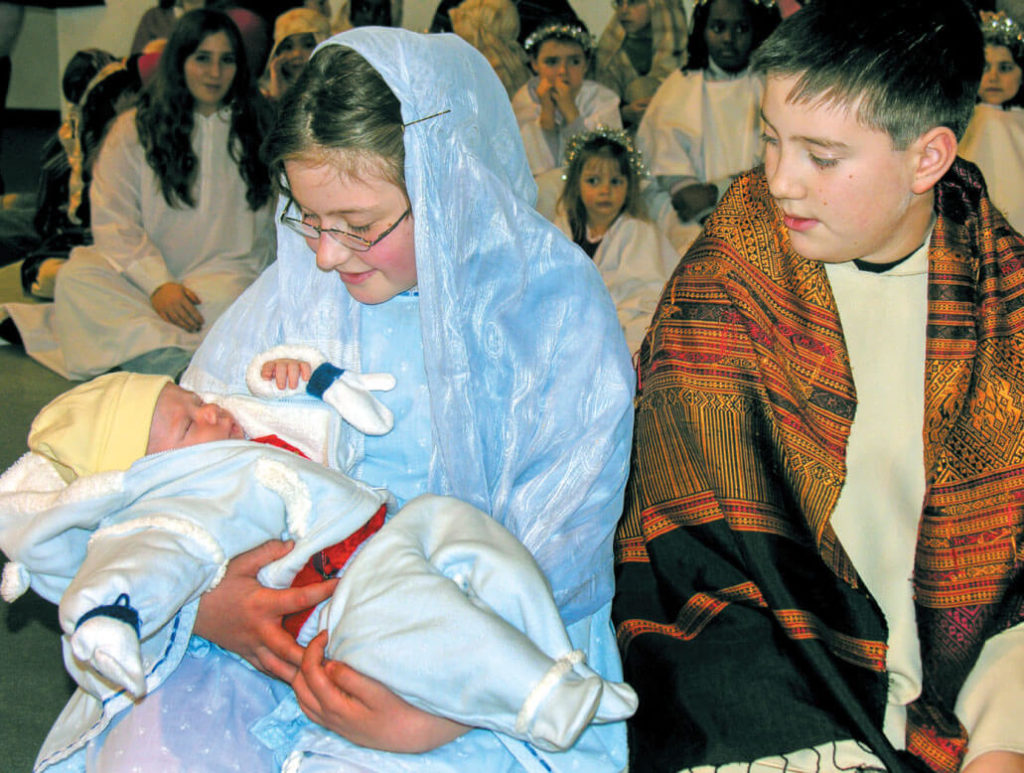
Christmas focuses Christians on Jesus as a newborn baby, a gift to the world, and celebrates all our children as gifts to the world. Fittingly the Church celebrates the Feast of the Holy Family right after Christmas. Already in Sunday’s gospel Jesus is a tween, a 12 year old who goes his own way instead of journeying home from Passover with his parents.
Mary and Joseph include Jesus in their religious practice. He accompanies them and other friends and relatives to Jerusalem to celebrate Passover. Jesus is also at the age when the human brain begins to develop its abstract thinking skills. He can think, reason, and question. With these skills a young person steps beyond accepting all he or she sees and hears and begins to questions and search.
Jesus’ questions take him to the temple to sit among teachers who know Israel’s history and holy writings. This process apparently absorbs him for the three days it takes for Mary and Joseph to miss him, return to Jerusalem, and find him. Today parents could have messaged their independent child or called the police who check the cameras on every corner. Instead Mary and Joseph have to walk back a day’s journey with anxiety building.
What they find is Jesus taking a first step into his adult vocation. His questions and answers amaze all who hear him and astonish his parents. Mary and Joseph express their worry but they don’t yell. Like a tween, Jesus is unaware he is causing worry.
Identity is the work of the adolescent years. As they grow up, children absorb the values and thinking of their families. As their brain power increases, teens move into a wider world and begin to respond to how others see them. They have to sort out who they want to be, what they stand for and value, who they stand with. The sorting goes on into the twenties.
Today one third of all Americans ages 18-33 are non-affiliated with any religion for many reasons. For some, the sexual abuse scandals have alienated them, for others, GLBTQ issues. Teens today may have two moms or two dads. They may believe love is love and support same sex marriage, which Church leaders teach against as they do contraceptives, divorce, abortion, and women’s ordination.
Adolescence is an important time for teens and parents to search each other out and keep talking. These years are not for giving up on teens but for accompanying them, learning what matters to them, walking with them in their successes and failures, engaging their questions and insights.
- What is adolescence like for teens today?
- What value do you experience in continuing to talk?
- Who talked with you about faith and purpose in your teen years?
- With what young people have you talked about how you live and practice your faith?
Only Luke tells a story about Jesus during the years between his infancy and public ministry. Sunday’s gospel takes place during his family’s yearly pilgrimage to Jerusalem to join with friends and family in the Passover celebration. This detail tells us Jesus’ parents practice Jewish religious traditions. They make the four-day walk from Nazareth to Jerusalem.
The gospel also suggests that the journey to Jerusalem is fun, with friends and family members walking together, visiting with different ones as they walk along all day, perhaps singing the psalms of ascent. Participating in the feasts, stories, and traditions of his people is one way Jesus receives his religious education.
- What importance has participating in parish worship and parish life as a child had on your adult faith?
- Who has most influenced how you live your adult Christian life?
Mary and Joseph have walked a whole day away from Jerusalem when they find Jesus missing. Walking back takes a day. They find Jesus on the third day. For three days his parents wonder where he is. In this story Luke anticipates who Jesus is, a teacher of teachers, questioning, listening, offering insights, amazing hearers.
When Mary anxiously questions why he didn’t tell them where he was, Jesus expects they should have known what he was doing. He must be about his Father’s affairs. In Luke’s gospel, the word must refers to the role his Father has given Jesus. Later he tells his followers, “I must preach the good news of the kingdom of God” (4.43) and “The Son of Man must suffer…be killed…and on the third day be raised” (9.22).
As Sunday’s gospel ends, Luke restores Mary to character by saying she stores all these things in her heart. Mary at the manger and 12 years later at the temple treasures the words and encounters with others that happen in her life. To treasure is to hold in mind, to remember. Mary holds onto words and events that reveal the Spirit moving in her life and the life of the son she holds dear.
Mary gives us a model of a reflective disciple. Like us she must use her head and open her heart to all that happens in her life.
Mary goes through the steps every believer goes through. She is amazed at Jesus’ insight and wisdom; baffled by why he left their company; reproachful about the fear she experienced; and finally, willing to keep reflecting on what happened. Her lack of understanding is not permanent. It prepares her for future participation in the believing community that will form after Jesus’ resurrection. She is the model disciple for this new community.
- How is the way you work at reflecting on your life like the way Mary reflects on hers?
- How is Mary and Joseph’s experience of raising a near teen like your own?
